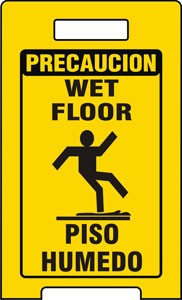
Tonight, I heard a non-native Spanish speaker make a MAJOR mistake in Spanish here in Medellin, Colombia. It is a very common mistake that many native English speakers make with the Spanish language so I wanted to bring this to your attention while it is still fresh on my mind.
Tonight, I was at the “gimnasio” here in Medellín called Body Tech (pronounced, of course, with a Latino accent.)
While I was in the “gimnasio” an American was on the treadmill and I heard him say to his Colombian friend:
“Casi me caí”
(“I almost fell”)
I waited for his Colombian friend to correct his Spanish, but he didn’t. Maybe the Colombiano didn’t want to embarrass his American friend in a gym full of Colombianos.
But do you know what’s wrong with this phrase?:
“Casi me caí”
(“I almost fell”)
Well, the speaker is THINKING in English while he is SPEAKING Spanish.
What do I mean by that?
In English, we use the past tense to describe an event that “almost” happened in the past but didn’t.
For example:
I almost fell.
I almost died.
I almost arrived late.
I almost slipped.
How To Say I Almost Fell or I Almost Slipped in Spanish
past but did not happen. In Spanish, you MUST use the present tense when talking about an event that “almost” occurred in the past but did not actually happen.
So the guy that almost fell on the treadmill should have used Spanish’s present tense and said:
Casi me caigo.
(I almost fell).
Literally, “I almost fall.”
And the same is true for these phrases:
Casi me muero.
(I almost died.)
Literally, “I almost die.”Casi llego tarde.
(I almost arrived late.)
Literally, “I almost arrive late.”Casi me resbalo.
(I almost slipped.)
Literally, “I almost slip.”
You may also hear native Spanish speakers use the phrase “por poco” instead of “casi” for the English
word “almost.” Por ejemplo . . .
Por poco me caigo.
(I almost fell.)Por poco me muero.
(I almost died.)Por poco llego tarde.
(I almost arrived late.)Por poco me resbalo.
(I almost slipped.)
Without getting off track, do you know how to say “wet floor” in Spanish?
You could say “piso mojado” but instead of “piso mojado,” in Colombia I always see signs in “los supermercado” (the supermarkets) that say “piso húmedo.” The Spanish word “húmedo” can mean either wet or damp.

By the way, I am VERY familiar with the rule of Spanish grammar requiring one to use the present tense when talking about an event that almost occurred in the past but did not actually happen. That’s because I still remember the very first time that I made this mistake.
It was in Nueva York (New York) and I was with a native-Spanish speaking friend, who is also a Spanish instructor. And we went to buy a few things for a party that he was having at his house that night.
And “el piso estaba mojado en el supermercado” (the floor was wet in the supermarket)
I almost slipped and fell on the wet floor and I INCORRECTLY said:
“Casi me resbalé y me caí.”
And that’s when he explained to me that in Spanish you MUST use the present tense when talking about an event that “almost” happened.
The “abogado” (lawyer) in me insisted on an explanation and wanted to know “¿por qué?” (why?)
His response:
You can only use the preterit tense to talk about an event that actually happened in the past and not
something hypothetical.
My response:
I almost slipped and fell. That was a real event that actually happened in the past. That was not hypothetical. I really almost slipped and fell.
His response:
[Complete Silence]
I guess there are things about any foreign language that will never make sense to people who are not native speakers of that language.
This reminds me of a question a native Spanish speaker asked me when learning English. He asked me “why do you say ‘shut up’ in English? Doesn’t it make a lot more sense to tell someone to ‘shut down’?”
“It only makes a lot more sense to a non-native English speaker,” is what I told him.





